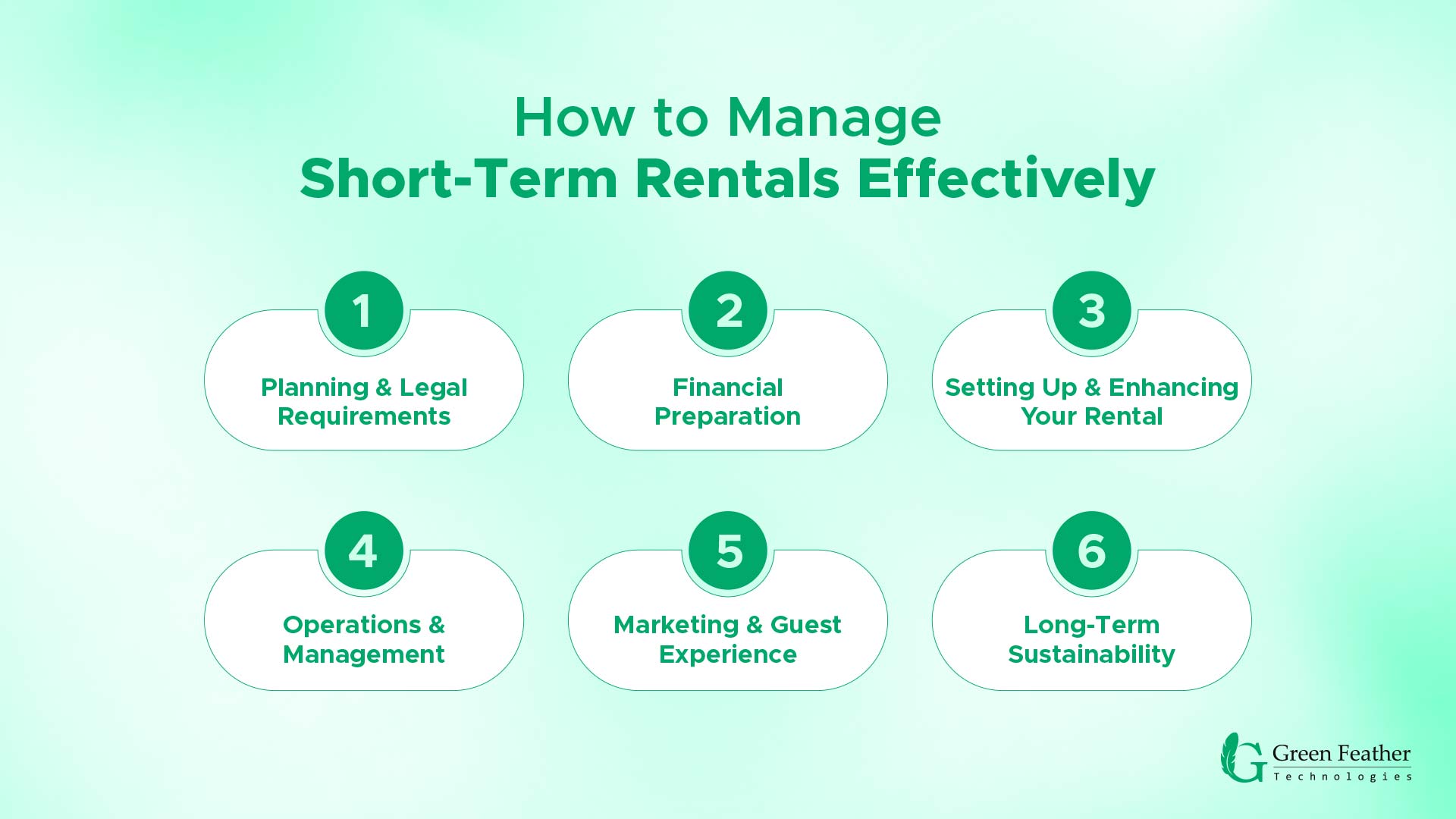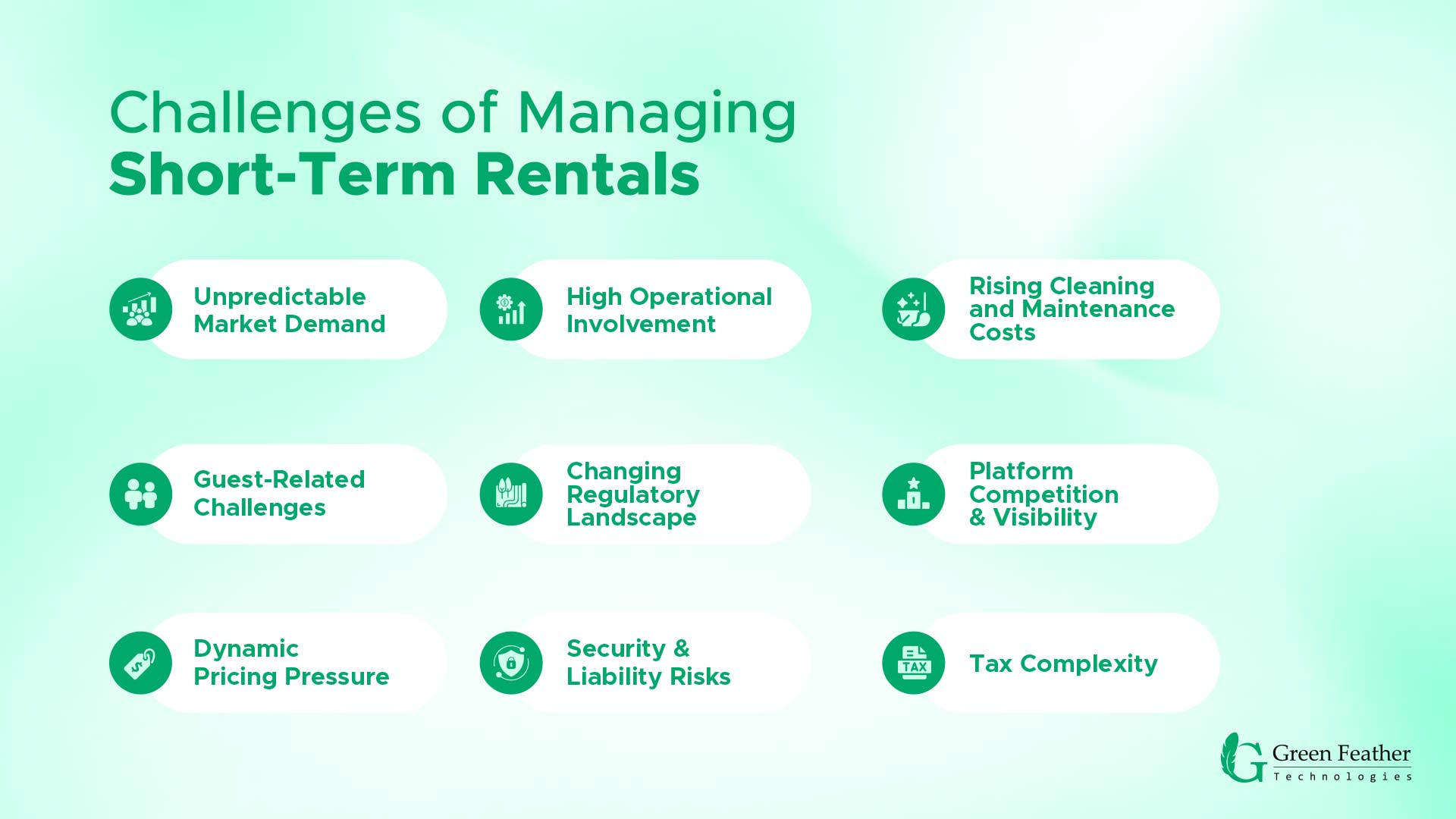Property owners are often worried about how to manage their short-term rentals. Because it is essential to maximize their profits and provide a seamless guest experience.
Managing short-term rentals involves attractive listing, regular maintenance, clear guest communication, optimizing pricing and utilizing technology to streamline operations.
If you’re looking to take advantage of this growing market and maximize your rental income, here’s what you need to know. This ultimate guide will walk you through everything about how to manage short-term rentals efficiently.
What is Short-Term Rental?
The simplest way to define short-term rental is that short-term rentals are apartments, rooms, or homes rented for short periods. People can rent these places from a few nights to a few weeks.
There are various short-term rental options out there. These can be spare rooms in other homes or completely furnished properties. Even luxurious villas near beaches or mountains can be found on short-term rentals.
Some prominent examples of short-term rentals would be –
- Airbnb
- VRBO
- Vacasa
- Guestready
- Marriott homes and villas
How to Manage Short-Term Rentals Effectively: Step-by-Step

For any property owner, effectively managing their short-term rentals is crucial. Without proper management, you can never get the desired level of profitability out of this venture.
Let’s take a step-by-step approach to managing short-term rentals effectively to get the most out of them.
Step 1: Planning & Legal Requirements
Before you even take that leap of starting a short-term rental business, establish a foundation. Plan out the whole thing and understand the legal requirements thoroughly. You don’t want these things to cause issues later in your business. The planning and legal requirements for managing short-term rentals are:
- Have a Business Plan: First, make sure you have a detailed business plan that outlines everything. It includes your goals, target market, revenue projections, marketing strategy, and operations. It works like a roadmap to your business success.
- Understand Legal and Tax Implications: Once you have the plan, start researching short-term rentals. Start with the legalities involved with the business in your locality. These can include local zoning laws, homeowner association rules, and city regulations. You would never want to get into legal trouble with this.
- Obtain Any Required Business Licenses: Obtaining all the relevant licenses is closely tied to legality. You must dig a bit to find the licenses required for a short-term rental business in your area.
Step 2: Financial Preparation
Here’s the thing: many people start with a business, but at some point, they lack the finances. You must prepare for the finances to ensure a sustainable, long-term, and profitable business. It’s not just having a property and renting it out.
- Calculate Start-Up and Ongoing Costs: Start the financial planning with the rental business’s startup costs. These may include furnishings, photography, smart home systems, and platform listing fees. Then, consider ongoing costs like utilities, maintenance, cleaning, and property management fees.
- Be Prepared for Expenses: No matter how much you plan, sudden expenses might occur. Keep some emergency funds for repairs, replacements, or even market downturns. It’s crucial to be prepared at all times.
- Optimize Pricing Strategy: Aside from managing money, you must also plan pricing strategies to stay in the market. Research what your competitors are doing, then create a pricing strategy accordingly. Here, consider seasonal variations, day-of-week, or local events.
Step 3: Setting Up & Enhancing Your Rental
Just like any other business, here you will also need to prepare your product, which is the property. You have to create an appealing, well-equipped rental property to attract guests. If you do it correctly, you can charge premium rates even in a competitive marketplace.
- Create an Attractive Listing: Setting up the rental starts with creating an attractive listing. You can start by investing in professional photography. This way, you can highlight the best features of your property. Then, write compelling descriptions focusing on the amenities and attractions you offer in your rental.
- Offer Attractive Amenities and Features: The descriptions should also include what you write in the rental. Ensure you are stocking up on the desirable amenities to add value to your rental. For instance, you can have high-speed internet, smart TV, quality linens, coffeemakers, or a well-organized kitchen.
- Implement Smart Home Systems: Integrating a smart home system is a great way to enhance your rental. You can introduce stuff like keyless entry systems or smart thermostats. Take it up a notch with noise monitoring devices and, of course, security cameras. Try to provide as much security as possible without breaching privacy.
Step 4: Operations & Management

In the next step, you focus on running things smoothly with proper management. Ensuring smooth daily operations is the key to successful short-term rental management. It leads to satisfactory guests, which leads to more profit for owners.
- Automate Check-In and Check-Out: Automation is an excellent method to ensure a smoother experience for the guests. Also, you won’t need someone to supervise the check-in or check-out process. You can implement self-check-in procedures using lockboxes, smart locks, or keypad entry systems.
- Hire a Property Manager: If you are not around your short-term rental often, then hiring a property manager will pay dividends. They can help you with handling guest communication, take care of maintenance, and tackle emergencies. It’s a worthy investment in the long run.
- Find Reliable Contractors: It’s very important to make sure your rental is always in good condition. That’s why building a relationship with dependable contractors is crucial. Always be in touch with maintenance professionals, plumbers, electricians, and handypersons to respond to urgent issues.
- Hire a Professional Cleaning Service: Keeping your rental clean at all times is essential to attracting guests. Partner with a professional cleaning service that specializes in vacation rentals. It’s essential to hire such a service so that they know and maintain high standards for guest turnover.
- Prioritize Maintenance and Cleanliness: A lack of maintenance and cleanliness can rapidly kill your reputation in short-term rentals. You must develop a solid preventative maintenance schedule to maintain and build upon that reputation. It will help you to avoid issues. And, of course, regular cleaning is a must as well.
- Be Energy-Efficient: Energy efficiency can help you in two ways. One is reducing utility costs, and another is appealing to environmentally conscious guests. You can do that with programmable thermostats, energy-efficient appliances, and LED lights.
Step 5: Marketing & Guest Experience
One of the most vital steps in managing short-term rentals is effective marketing and satisfactory guest experience. These two help you stand out in the competition for the short-term rental marketplace.
- Advertise Your Vacation Rental: Just like any other business, you have to advertise your short-term rentals. To get the most out of it, you can list your property on multiple platforms for maximizing visibility. Make sure you have a story that resonates with people to connect and appeal to more guests.
- Use Vacation Rental Management Software: There are various rental management software out there to help you out. Leverage this software to ease the rental process. You can find streamlined rental solutions, synchronize calendars across platforms, and automate guest communications.
- Focus on the Guest Experience: You want your guests to have the best experience so they can return and make recommendations. To create such an experience, you should focus on adding thoughtful touches. Things like welcome guides, local recommendations, and some welcome gifts can create a lasting impact.
- Focus on Getting Positive Reviews: Let your guests speak for you through their reviews. It will help you build the most credibility and improve your visibility on the platforms. You can only do that by ensuring the best possible service from your rental.
Step 6: Long-Term Sustainability
When you start a short-term rental business, you can’t focus only on the daily stuff. You should also focus on long-term sustainability to protect your investment in the future.
- Protect Your Assets: You have to make sure you are securing your short-term rental property in every possible way. Whether it be through insurance coverage, installing security systems, or establishing house rules. Just make sure none of these affects the guest experience of your rental.
- Stay Organized For Tax Season Year-Round: Tax evasion or facing tax issues can have grave consequences. To avoid those, make sure to maintain meticulous records of income and expenses. This will help you simplify the tax preparation and maximize legitimate deductions.
- Use technology: Take full advantage of advanced technology to evolve and keep up with trends. Keeping up with technology can help you improve operational efficiency, enhance the guest experience, and appeal to more people. Altogether, you get a competitive advantage from this.
Differences Between Short-Term and Long-Term Rental Property Management

Understanding the significant differences between short-term and long-term rental is crucial. They help you to decide which approach you should take for your property management.
Here is a table to quickly understand the differences –
| Aspect | Short-Term Rentals | Long-Term Rentals |
|---|---|---|
| Market Demand and Pricing | Highly variable, influenced by seasonality & events | Stable, influenced by local rental market trends |
| Furnishing and Amenities | Fully furnished, high-quality amenities | Typically unfurnished, basic amenities |
| Operational Intensity | High, frequent turnovers, 24/7 guest support | Low, less frequent turnovers, minimal support |
| Legal and Tax Implications | Complex, varying by location, transient occupancy | Simpler, standard lease agreements |
| Insurance and Liability | Specialized short-term rental insurance required | Standard landlord insurance |
| Tenant Relationship | Focused on hospitality & quick response | Focused on building stable relationships |
Platforms for Marketing and Managing Short-Term Rentals
Choosing the right short-term rental platform that aligns with your goals and requirements is crucial for long-term success. You can reach your audience and maximize bookings with the right platform. Each platform has something to offer, so it’s important to go through them all and see which fits your needs more.
Airbnb
Airbnb is the most recognized platform in the short-term rental market. With more than 150 million users, they can provide you with great visibility. However, it also means there’s a lot of competition on this platform. So, if you have a property that can easily stand out, this might be the way for you. Learn more about how to handle Airbnb remotely.
VRBO (Vacation rentals by owner)
VRBO is another popular platform that focuses on entire home rentals. The target here mostly are family travelers looking for spacious places. If you have a high-end property and plan to get longer average stays, then VRBO can be a great option.
Booking.com
Booking.com a platform with massive global reach and a diverse audience, including hotel bookers. They provide instant booking features and attract more international travelers. You can opt for them, especially to establish your business in Europe.
Expedia
Expedia is a great solution for listing your short-term rental as you get exposed to a broad travel audience. Their integration with multiple travel services increases your visibility a lot. However, the downside with Expedia is their relatively high commission fees.
TurnKey
If you want an all-in solution for your short-term rentals, Turnkey might be a good choice. It’s a full-service property management platform that handles everything from marketing to cleaning. They charge a higher commission rate for all the extra work they put into their services.
Azibo
To manage your finances for your rental properties, you can try out Azibo. Its platform lets you manage your rental finances, including rent collection, expense tracking, and even tax preparation. In short, you can prepare yourself for all financial situations regarding rental properties.
Zillow Rental Manager
Even though Zillow’s rental manager specializes in long-term rentals, you can still try them out for month-long stays. They are great for marketing your rental property with their large user base. And the best part is you can do everything from renting your place to collecting rent online.
Vacasa
With a wide range of rental property services, Vacasa is an exceptional platform for listing your property. It boasts itself as a full-service property management company that handles all aspects of rental management. The drawback is their significant commission fees.
Evolve Vacation Rental
Unlike Vacasa or other full-service platforms, Evolve Vacation provides partial management services. They advertise properties, manage the rental calendar, handle bookings, and answer guest inquiries. The best part about Evolve is its cost-effective prices and low commission rates.
Casago
Casago is also a full-service property management company focusing mostly on regional management. They specialize in operating in multiple regions across the United States and Mexico. So, if your business is in that region then, Casago might be the perfect option for you.
Benefits of Investing in Short-Term Rentals
The thriving popularity of short-term rentals boils down to the benefits it provides. Its short-term renting model has several advantages over the traditional long-term renting model. Going through the benefits should clear things up –
Higher Return on Investment (ROI): If you can manage your short-term rentals well enough in a proper location. In that case, they can generate 2-3 times the revenue than long-term rentals. The number can go even higher during the peak seasons and local events.
Flexibility: Short-term rentals are great for their flexibility. You can access your property whenever you need to use it. And when you are not using it, you can generate rental income through it.
Tax Benefits: You can take tax advantages with short-term rentals as business expenses related to the property. It includes furnishings, supplies, management fees, and travel expenses to maintain the property.
Diversification of Investment Portfolio: Short-term rentals can be a unique way to approach real estate investment. Their risk and return characteristics differ entirely from traditional rental properties. It helps keep your investment diversified and minimizes the risk of loss.
Demand Driven by Tourism and Business Travel: Tourism and business travel are already increasing, which also increases the necessity of short-term rentals. With a short-term rental property, you can easily leverage the increasing numbers of travelers and tourists.
Control Over Property Usage: Long-term rentals remove your control over property usage, as people tend to live there for a long time. Short-term rentals give you the option to oversee your property more frequently. You can inspect your property during guest turnovers for proper maintenance and cleanliness.
Challenges and Solutions of Managing Short-Term Rentals

While short-term rentals offer significant potential rewards, they also come with a fair share of challenges. You can only tackle those challenges through careful market analysis and research before entering this business. Below, we share the challenges and the process to handle them.
1. Unpredictable Market Demand
A common trouble you must prepare for is the unpredictable market demand. There are peak seasons like Christmas, Thanksgiving, and New Year’s, and local events like the FIFA World Cup, the Olympics, or music festivals. These work in favor of your short-term rental.
But there are also issues like pandemics or other unexpected events that can cause serious problems in your business. How do you solve the issue?
Solution: How do you solve the issue? It’s simple. you can diversify your target market to appeal to leisure and business travelers. For a steady income, you can also offer attractive weekly or monthly rates during off-peak periods.
2. High Operational Involvement
Another challenge with short-term rentals is managing the daily operations. Compared to long-term rentals, you must be more involved in daily operations like guest communication, cleaning, and urgent issues.
Solution: You can take several actions to ease this process of daily operations. It includes automating routine tasks using property management software. You can also hire a virtual assistant to handle all the daily administrative operations, such as communications and record keeping.
3. Rising Cleaning and Maintenance Costs
Since short-term rentals experience frequent turnovers, you must account for higher cleaning and maintenance costs. You will need to spend quite a lot of money on increased wear and tear on furnishings and appliances.
Solution: You can implement a solution here. Negotiate with cleaning services for regular work. This can significantly reduce the cost of maintenance and cleaning. Follow strict maintenance schedules to avoid costly repairs that cause long-term damage.
4. Guest-Related Challenges
Not every guest in your short-term rental will be satisfied with what you provide. They will pose challenges like parties, noise complaints, or property damage. It’s important that you can handle such guests with grace. You don’t want to be unprofessional.
Solution: Dealing with such challenging guests can be straightforward. You must set clear house results and communicate the rules before booking confirmation. Proper vetting of guests and thorough communication is key to handling these challenges.
5. Changing Regulatory Landscape
Regulations and legal issues often undergo updates from time to time. Sometimes, they implement restrictions, permits, or taxes with the bare minimum of notice.
Solution: An excellent way to tackle this challenge is to join local short-term rental associations. This way, you will always be informed about any regulatory changes. You can also closely work with a lawyer specializing in short-term rental law to ensure you are always compliant.
6. Platform Competition & Visibility
Short-term rental is becoming highly popular, and competition is increasing. Being visible in that saturated market can indeed be a challenge. You will have more difficulty, especially if you choose to be a part of a popular platform.
Solution: To go about this issue, you can employ professional measures. Things like professional photos for creating listings and compelling descriptions help a lot. The most important thing is ensuring you provide the best service so people leave positive reviews.
7. Dynamic Pricing Pressure
The short-term rental environment is dynamic, with competition changing prices based on situations. You have to always keep up with your competition and the situation to adjust pricing frequently. Getting that balance of appealing price and profitable price is crucial.
Solution: A clear solution for you is to utilize specialized dynamic pricing tools like PriceLabs or Wheelhouse. They automatically adjust your rates based on demand, local events, and competitor pricing. With these, you can easily keep up with the pressure of setting dynamic prices.
8. Security & Liability Risks
As guests will frequently change, you must consider that many things can go wrong. This increases the chances of liabilities and also adds to security concerns. So, you must be prepared with robust insurance coverage and security measures.
Solution: You can install security cameras (exterior only) and smart locks with unique access codes for each stay to increase security. You can also include digital guidebooks with safety information for further guidance. Also, make sure you have short-term rental insurance covering commercial guest usage.
9. Tax Complexity
There are several tax complexities associated with short-term rentals. It includes income taxes, occupancy taxes, and local lodging taxes. Navigating through these can add up to an administrative burden for your business.
Solution: What you can do to solve this is to use specialized short-term rental accounting software. It helps you track your income and expenses. Also, try hiring a tax professional to help you with the various taxes.
Case Study: Paris Olympics 2024 – A Short-Term Rental Challenge
During the Paris Olympics 2024, short-term rental demand surged. The hosts saw a sharp increase in bookings. Though, the event created profit opportunities, but it also led to challenges like inflated pricing, last-minute cancellations, and overbooking risks. Some property owners struggled with maintaining quality service due to high guest turnover.
Solution: Some hosts prepared in advance by adjusting pricing dynamically. They set strict cancellation policies, and streamlined check-in processes. The hosts also partnered with cleaning services for quick turnovers and ensured compliance with evolving rental regulations. By planning ahead, they maximized revenue while maintaining guest satisfaction.
Self-Managing vs. Hiring a Short-Term Rental Property Management Company
As a short-term rental owner, you will often face the trouble of managing it yourself and hiring a company. Each approach comes with its set of advantages and disadvantages. Go through this comparison table to clearly understand which one you should pick for your property.
| Aspect | Self-Managing | Rental Property Management Company |
|---|---|---|
| Control and Decision Making | Complete control over all aspects of your rental business, from pricing to policies | Surrender some control to professionals who make day-to-day decisions based on their expertise |
| Time Commitment | Significant time investment for guest communications, booking management, coordination of services, and problem-solving | Minimal time is required; the management company handles most aspects of the operation |
| Expertise and Experience | Learning curve required; must develop skills across multiple domains | Immediate access to industry expertise, established systems, and best practices |
| Costs and Fees | Lower direct costs | Management fees typically range from 15-40% |
| Marketing and Bookings | Full responsibility for creating listings, managing the calendar, setting rates, and responding to inquiries | Professional listing creation, multi-platform distribution, and optimized pricing strategies |
| Maintenance and Cleaning | Must find, vet, and coordinate reliable service providers | Established relationships with quality vendors, often at better rates due to volume |
| Legal And Compliance | Personal responsibility for understanding and adhering to all regulations | Guidance on compliance issues and often assistance with permits and licenses |
| Guest Communication and Support | Direct relationship with guests; 24/7 availability needed for issues | Professional guest services team handling all communications and emergency situations |
| Performance and Reporting | Must create own tracking systems and performance metrics | Detailed reporting on financial performance, occupancy rates, and market trends |
| Profitability | Higher potential profit margins when managed efficiently | Potentially higher gross revenue through professional marketing and pricing |
How to Select the Right Short-Term Rental Property Management Company
Picking the right short-term rental property management company is crucial for the success of your business. With the right partner, you can easily excel at it without too many obstacles. Here’s how you can find the perfect partner –
1. Read Property Management Reviews
You can start your search for the right partner by researching online reviews and asking for references from current clients. It’s the most authentic information you will get. Also, check the company’s reputation in the short-term rental community for further clarification.
2. Do a Cost Analysis
The next thing you do is request a detailed breakdown of all fees. These may include base management fees, maintenance costs, and additional costs. Compare these against projected revenue increases to determine the actual value.
3. Learn How Regularly You Can Expect Reports
You should also establish expectations for the frequency and detail of financial reporting. Professional companies provide comprehensive monthly statements showing bookings, revenue, expenses, and occupancy rates. Judge according to that.
4. Assess their Market Expertise
Assessing the company’s market expertise also plays a huge role. You have to evaluate their knowledge of your specific market. It includes seasonal trends, local regulations, and competitive pricing strategies. Ask about their current portfolio in your area and performance metrics.
5. Evaluate Their Customer Support
Lastly, you can test their responsiveness and communication style during your evaluation. If they’re slow to respond to you as a potential client, they may provide similar service to your guests. In that case, you would want to avoid such a company and look for a better one.
How a Virtual Assistant Can Help Manage Your Short-Term Rental Property

Hiring a short-term rental virtual assistant can be a great alternative if you don’t want to use a full-service property management company. It offers a balanced solution between hiring a short-term rental management company and managing the property yourself.
Let’s explore the services a virtual assistant can provide to help with short-term rentals.
a. Handling Guest Inquiries and Bookings
A dedicated virtual assistant can ensure no inquiry goes unanswered and that every guest receives prompt, professional communication throughout their journey.
- Responding to guest messages and inquiries
- Managing reservation schedules
- Sending booking confirmations and check-in instructions
b. Managing Online Listings and Pricing Updates
Virtual assistants can help you keep your property competitive and visible in the marketplace. They do it with consistent updates and managing optimizations.
- Updating property descriptions and photos
- Adjusting nightly rates based on market trends
- Ensuring listings are optimized for visibility on platforms
c. Coordinating with Cleaners and Maintenance Staff
A virtual assistant can ensure seamless coordination between guest departures, cleaning services, and new arrivals. These are all essential for smooth operations and a positive guest experience.
- Scheduling cleaning and maintenance services
- Communicating with contractors for repairs
- Ensuring the property is guest-ready at all times
d. Organizing Financial Records and Tax Documents
Virtual assistants specializing in short-term rental bookkeeping can maintain organized, accurate financial records. It helps keep all kinds of papers and records well-organized.
- Tracking rental income and expenses
- Preparing reports for tax filings
- Managing invoices and payment records
For a professional and reliable virtual assistant, you can hire a virtual assistant from Green Feather Technologies.
Conclusion
Well, to sum up, knowing how to manage short-term rentals can make your business. You have to take a strategic approach and manage the property accordingly.
There are some added operational challenges compared to long-term rentals. However, short-term rentals do come with many benefits, and if you can manage them, you can leverage a lot out of them.
Our guide here should give you the perfect outline for approaching the short-term rental business and getting your desired success.
FAQs
1. What are the key responsibilities of a short-term rental manager?
A short-term rental manager is responsible for listing management, guest communications, pricing strategy, booking administration, cleaning coordination, maintenance oversight, review management, and financial record-keeping.
2. How can I effectively market my short-term rental property?
Effective marketing involves professional photography, compelling property descriptions, listing on multiple platforms, social media promotion, creating a unique brand identity, and targeting specific traveler demographics suited to your property.
3. How do I set competitive pricing for my short-term rental?
You can research similar properties in your area. You should understand their seasonal demand patterns, monitoring local events that drive tourism, and implementing dynamic pricing strategies that adjust rates based on demand fluctuations.
4. What are the common mistakes to avoid when managing a short-term rental?
Common mistakes while managing a short-term rental include underestimating cleaning and turnover time, poor guest screening, inadequate house rules, neglecting preventative maintenance, ignoring local regulations, pricing incorrectly, and failing to secure proper insurance coverage.
5. How do I handle guest complaints and negative reviews?
Address complaints immediately and professionally. Offer fair solutions when issues arise. Follow up after resolution, respond thoughtfully to negative reviews explaining steps to address concerns, and implement changes to prevent similar problems.
6. What legal requirements do I need to consider when managing a short-term rental?
You need to consider zoning laws, business licenses, permits, homeowner association restrictions, local short-term rental ordinances, tax obligations (income, sales, and occupancy taxes), and compliance with safety regulations.
7. How do I ensure the safety of guests in my short-term rental property?
You can ensure guest safety by installing smoke and carbon monoxide detectors, fire extinguishers, first aid kits, emergency contact information, secure locks, exterior lighting, clear evacuation plans, and regular safety equipment inspections.
8. What are the tax implications of managing a short-term rental?
Tax implications of managing a short-term rental include reporting rental income, deducting eligible expenses, collecting and remitting occupancy or lodging taxes, potential sales tax obligations, and possibly self-employment taxes, depending on your business structure.
9. What is the best way to handle cleaning and maintenance for short-term rentals?
Establish relationships with reliable cleaning services experienced in vacation rentals to handle cleaning and maintenance for short-term rentals. Create detailed cleaning checklists, implement regular deep cleaning schedules, perform preventative maintenance, and develop systems for quick response to urgent issues.
10. How can I maintain high occupancy rates for my short-term rental?
You can maintain high occupancy by optimizing your listing for search algorithms, providing exceptional guest experiences, encouraging positive reviews, implementing strategic pricing, offering discounts for extended stays during low seasons, and marketing to diverse traveler segments.
11. What insurance do I need for a short-term rental property?
You need specialized short-term rental insurance that covers property damage, liability protection, business interruption, and theft.
12. How do I manage the finances of my short-term rental efficiently?
To manage the finances of your short-term rental efficiently, separate business banking accounts, dedicated credit cards for expenses, specialized accounting software for short-term rentals, detailed record-keeping systems, and regular financial performance analysis.



